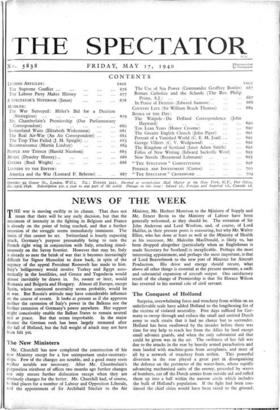The New Ministers
Mr. Churchill has now completed the construction of his n.:w Ministry except for a few unimportant under-secretary- ships. Few of the changes are notable, and a good many seem n-ither notable nor necessary. After Mr. Chamberlain's plrposeless stirabout of offices two months ago further changes can only ensure further dislocation except When they are obviously changes for the better. Mr. Churchill had, of course, t,. find places for a number of Labour and Opposition Liberals, a id the appointment of Sir Archibald Sinclair to the Air Ministry, Mr. Herbert Morrison to the Ministry of Supply and Mr. Ernest Bevin to the Ministry of Labour have been generally welcomed, as they should be. The retention of Sir John Anderson and Lord Woolton, and, of course, of Lord Halifax, in their present posts is reassuring, but why Mr. Walter Elliot, who has done at least as well at the Ministry of Health as his successor, Mr. Malcolm MacDonald, is likely to, has been dropped altogether (particularly when an Englishman is made Secretary for Scotland) is inexplicable. Perhaps the most interesting appointment, and perhaps the most important, is that of Lord Beaverbrook to the new post of Minister for Aircraft Production. His drive and energy should secure, what above all other things is essential at the present moment, a swift and substantial expansion of aircraft output. One satisfactory result of the change of Premiership is that Sir Horace Wilson has reverted to his normal tole of civil servant.


































